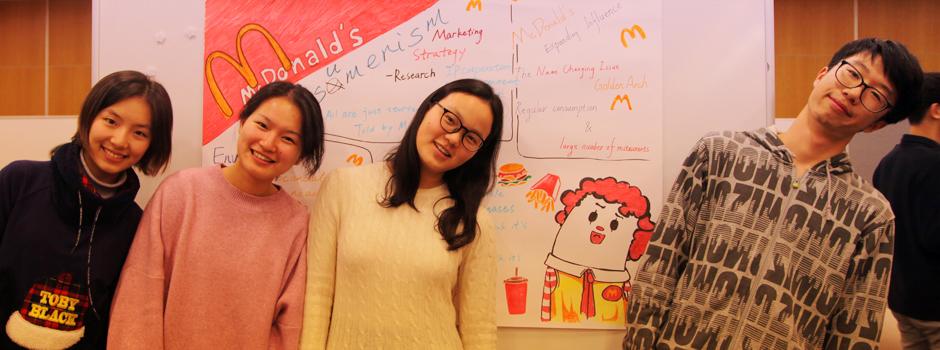Freshmen of the English for Academic Purposes Program (EAP) showed off their posters, business pitches and video projects during this week’s two-hour end-of-semester exhibition.
Each fall semester, the show gives students a chance to present aspects of their semester-long projects in an environment more spontaneous than the classroom, yet still academic. In EAP, students focus their attention on learning outcomes related to presenting, interviewing, and active listening, in addition to several other academic skills.
This semester, the course is offered through five different seminar themes, encompassing social science, philosophy, business, science and urban studies.
“An important yet overlooked part of speaking, and one that is difficult to assess outside the language classroom, is active listening, which is essential to successful communication throughout a student’s academic career and beyond,” said Brandon Conlon, associate director of the program.
“By taking part in this show, students will have a chance to demonstrate both their speaking and active listening skills by engaging with other students, faculty, and staff, to describe and explain their work,” he added.

Liu Yixuan, a student from Conlon’s course of Negotiating Self and Other, investigated the shaping of one’s identity and, on a higher level, how cultural identity survives in a globalized era.
“Identity is a complicated concept, which involves your imagined self, your experiences, and perceptions of others,” she said. “I want to find out how globalization impacts one person on the micro-level.”
Cai Tingting from lecturer Genevieve Leone’s Business in the 21st Century class, taught by EAP, pitched her toy-sharing business project Sharebox, an idea that stemmed from observing that children’s toys remain largely idle in most households.
“The sharing model will reap many social benefits as children make new friends when toys are passed from one to another; it also can be applied to rural education and teach children how to make and design toys,” she said.

Ding Yuhao, Peng Xizhu, Chen Meichen from Marcella Caprario’s class of Science in the Public Sphere, teamed up to examine the ambiguous relationship between science and the media. Through rounds of surveys and interviews, they concluded that science is often distorted by an audience’s lack of scientific literacy, and through scandals and biases.
“We learned how to properly conduct interviews through open questions instead of misleading our interviewees,” Ding said. “Also, we’ve learned how effective two-way communication is, and while listening to speakers, respond with affirmative gestures and expressions.”
Wang Peiyao from Anjuli Pandavar’s class of Cities & Urban Conscious took her research down the French Concession’s bustling Changle Road, interviewing local business owners, residents and passersby which then became a 15-minute documentary of her experience.
“It was hard to find and interview English speakers on such a traditional Shanghai street, but the experience really helped my communication and contingency-planning skills,” said Wang.
Xu Yitong and her team members presented a comprehensive study about the negative effects of consumerism on modern society, using the Walt Disney Company as an example. They investigated the many cultural misunderstandings and racial stereotypes often portrayed in Disney films, as well as the large amounts of waste accumulating in Disney’s parks.
“I have never realized how strongly consumerism impacts our lives,” said Xu, from Glen Cotten’s Consumerism and Happiness class. “The acquisition and consumption of goods surely won’t bring permanent happiness to us.”


